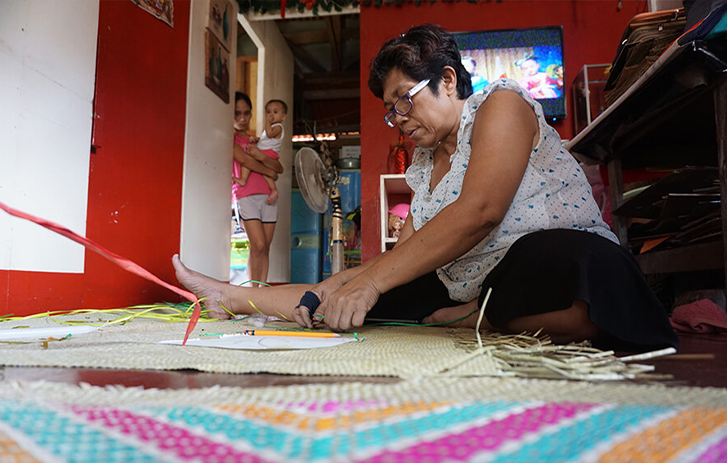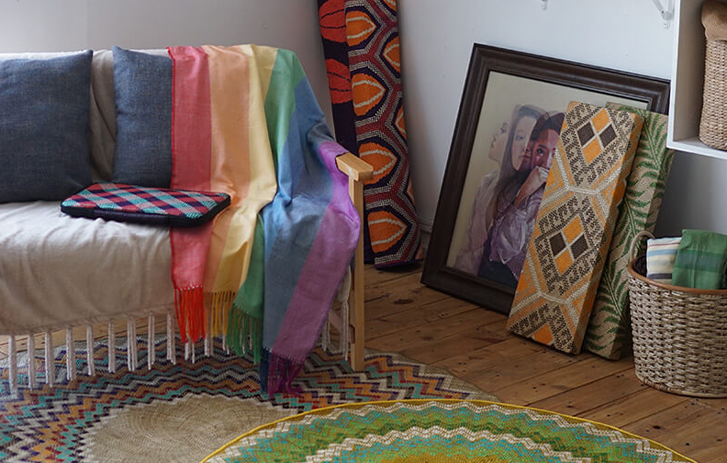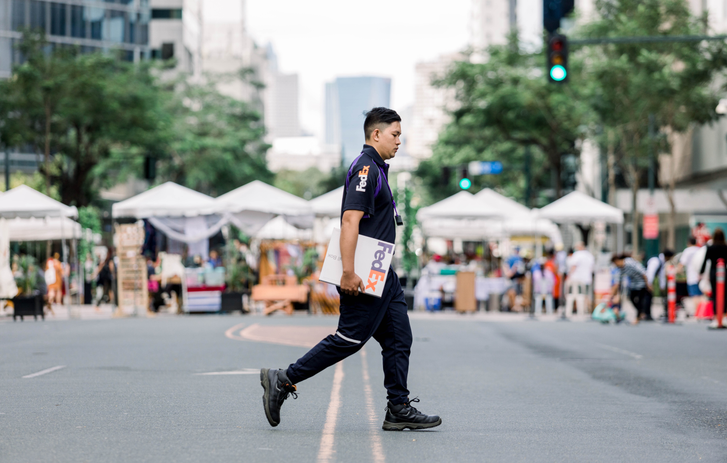
Woven: The SME That Revived The Filipino Weaving Industry
By FedEx | First published: June 14, 2022 Updated: September 5, 2024
Woven CEO and co-founder, Trish Lim is revitalizing local weaving traditions in her community, helping grassroots artisans to bring Filipino-made handicrafts to the global market.
- Centuries-old traditions of hand weaving are being revived in the Philippines, led by Woven, a brand established by local entrepreneur Trish Lim.
- The social enterprise employs Filipina craftswomen, who can better support their families with a steady income.
- Thanks to the brand’s focus on e-commerce and overseas marketing, customers across the globe can now brighten up their homes with Woven’s wares.
Forget fast fashion: interiors and textile trends are driving global consumers to recognize the value of one-of-a-kind, handcrafted pieces with a quality that lasts. Part of this movement is Woven, a social enterprise that empowers artisan communities to create livelihoods from weaving and embroidery. Its homegrown, handmade ethos champions a move towards high-quality handicrafts made by Filipino craftswomen.
Inspired by beautiful weaving traditions that originated in Samar, Philippines, the founders of Woven are promoting the exceptional craftsmanship and heritage of the Philippines to the rest of the world. Woven co-founder and CEO Trish Lim shares how the company is helping micro-entrepreneurs and grassroots Filipina artisans in the weaving industry thrive.
How did Woven Philippines start out?
Trish Lim: We launched Woven in 2017, after conducting a development study for a foundation after the disastrous Typhoon Haiyan in 2013. It opened our eyes to the reality of marginalized communities.
We were sent to the hardest-hit town in Leyte, Samar to find out how local incomes had been affected by the storm, and ways NGOs could support them. That’s when we discovered the banig or mat weavers of Samar. It sparked the idea of starting a social enterprise in partnership with them. Our concept was to link them to a commercial market, help them design, and provide opportunities for their livelihood.
Who are the people benefiting from this social enterprise?
Our weavers are mostly 50- to 55-year-old mothers. Some didn’t want their children to continue the craft because it didn’t pay well enough. Their average income at that time was P600-650 per month (USD 11-12).
We discovered that many artisans from different craft communities in the country were in the same situation. So, we expanded the reach of Woven to include craft communities in other provinces. Our offerings now include banig products from Samar, handwoven textiles from Benguet, placemats from Basilan, and blankets by hablon weavers from Iloilo.
Can you share more about Woven’s products?
Originally, banigs were used as sleeping mats. To save a dying craft and keep up with modern fashion trends, we decided to cater to a younger age group with products suitable for their dynamic, on-the-go lifestyles.
We now make laptop sleeves, bags, and work-from-home essentials. We’ve also developed a line of home and lifestyle products that are vibrant and colourful to reflect the Filipino personality and creative style.
How did your online store impact your operations and overall business?
We launched our website in 2017. Before that, we were selling through Facebook and Instagram. The advantage of online selling is that you’re always in touch with your customers. It’s a good way to reach a wider market and engage different types of customers instantly. With our e-commerce site, international customers can shop our products from Asia, America and Europe.
How do you empower Filipino women through this social enterprise?
More than 95% of our Samar weavers are women. At Woven, we do everything we can to uplift the lives of our artisans and weaving entrepreneurs. Through empathy, compassion, and persistence, we communicate with the weavers and encourage them to be open to growth so they can thrive in the weaving industry of the Philippines or in any industry of their choice.
Growing up, I’ve been at the receiving end of the phrase “Kababae mong tao…” (You’re a woman and yet…). It impacted the way I saw myself and the roles I’m expected to play. I’m happy to be living in a more progressive period where we’re able to explore the many facets of womanhood and pursue our different passions.
But I know we still have a long way to go in terms of educating people and empowering the next generation of women. For those who want to go into entrepreneurship, my advice would be to pick good partners and mentors. It helps to work with women who believe in the same causes and with men who treat you as equals.
How does Woven keep the tradition of weaving alive?
As advocates of the craft, we want to preserve this tradition and pass it on to future generations. We launched “Kabataan Krafts” (Youth Crafts) to foster the creativity of the children of the artisans we work with through workshops. Additionally, we want the community of weaving entrepreneurs to consider weaving as a viable source of income for their family.
That’s why we helped organize associations to manage their own enterprises in Samar. Here in the city, we launched an initiative called “Woven on the Move”, where we brought weavers to Manila to hold a series of workshops for senior high school students.
Our goal is to raise awareness of the centuries-old tradition of weaving among young people and at the same time, embolden our weavers to protect and preserve their craft.
When did you decide that it was time to explore international markets?
During the pandemic, our communities were badly hit because there were no tourists. Bulk orders from companies, a major source of income for us, were significantly reduced. Mobility restrictions also affected the procurement of supplies.
We decided it was time to expand our market base and tap into other countries. Since then, we have seen growth in numbers with global companies and entrepreneurs expressing interest in marketing our products. We realized that going global requires strong logistics support so that our products will be shipped on time and in good condition.
We learned that FedEx worked with several local SMEs, and we decided to try them. Our account officer walked us through the process, the service, and the platform. Being able to tell clients that we can ship products through FedEx is liberating. We can reach markets in South Korea, Taiwan, the United States, and Europe.
We also ran a global marketing campaign, collaborating with different artists who came up with their own woven creations. We wanted to send banig weaving kits to customers as far afield as New York and Canada, and we pulled this off with FedEx.
Woven’s purpose to enrich communities and foster cultural ties
Woven continues to launch various initiatives aimed at fostering creativity, collaboration, and leadership among the next generation of banig weavers and embroiderers in the community, contributing to the growth of the weaving industry in the Philippines. New products have been created and introduced to reach more diverse market segments.
Through their products, Woven hopes to increase awareness of the centuries-old tradition of weaving and create more advocates for these artisan communities.
Finally, by continuously tapping the international market for these handicrafts, Woven empowers Filipino women artisans and micro-entrepreneurs to keep their colorful traditions alive while making a more sustainable livelihood.
SHARE THIS STORY
- 85% Of APAC Businesses Plan To Expand Into Europe, According To New FedEx Report
- Generative AI: A New Frontier
- How To Ship A Giant Panda
- The Rise Of Intra-Asia Trade: Opportunities In The China-Southeast Asia Corridor
- Where Do Old Planes Go When They Retire?
- What’s So Dangerous About Coconuts? Your Guide To Dangerous Goods Logistics
Sign up now and save on your shipping rates!
Sign up now and earn discounts by shipping instantly with FedEx Ship ManagerTM at fedex.com.
Recommended For You

New Digital Opportunities For Filipino SMEs With E-Commerce
Amid the pandemic, many SMEs are pivoting their business models and moving online, in response to evolving customer demand and behavior.
Read More
Four Ways Generative AI Is Transforming Healthcare Beyond 2025
Explore AI’s impact on healthcare, from predictive diagnostics to pharma supply chains, and how it is improving patient care.
Read More
How To Manage Healthcare Supply Chain Risk Post COVID-19
Are you aware of all the factors that can impact how you manage your global healthcare product shipments?
Read More


